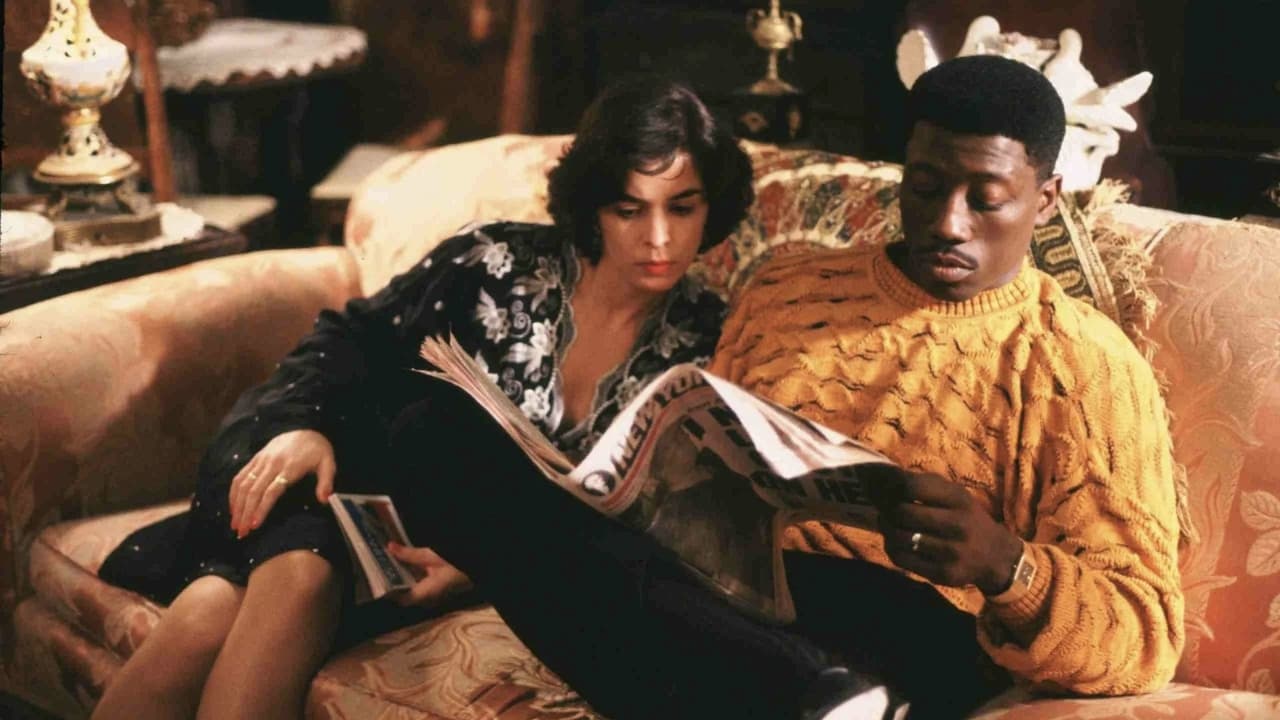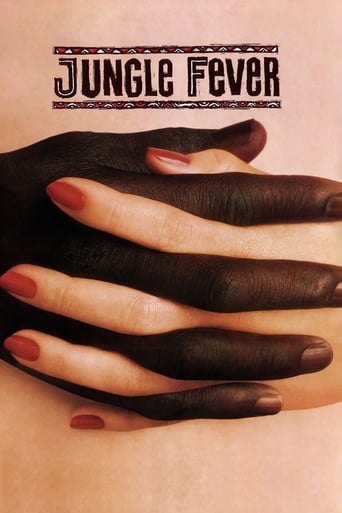

I have to start off by saying that I strongly dislike most of Spike Lee's films. I often disagree with his politics/point of view, and his messages in his films are often too preachy for me. But every time I see Jungle Fever, I think not only is it his best film, it's a phenomenal piece of work, that for whatever reason, is not often talked about among his greatest films. For me, it's kind of like how I think Kevin Smith is a terrible filmmaker, but I think "Chasing Amy" is very, very good. It kind of makes me wonder for both Jungle Fever and Chasing Amy if Lee and Smith are letting others do more of the work on these. Anyway, the acting and performances in Jungle Fever are of course phenomenal, with Samuel L. Jackson's first big hit as Gator, and Wesley Snipes is also excellent as Flipper. I believe none of these people were famous before this film, with the exception of John Turturro and Spike himself. The sequence where Flipper is searching for a drugged-out Gator with Stevie Wonder's "Livin' for the City" in the background is one of my favorite scenes across ALL films that I have ever seen. I also think that he and Scorsese have it right with how working class Italians speak/behave...I grew up in an area just like that. Finally, the scene where the black women are all discussing lightness of skin as being more desirable to black men is often a "third-rail" topic in the black community, so I appreciate Spike's courage in showing this.If you've never seen Jungle Fever yet, do yourself a favor and do so.
... View MoreJungle Fever, the feature film by Spike Lee directly preceding his well-respected biopic Malcolm X, is a whopping statement against drugs and white supremacy. To reference an earlier Lee "joint's" title, it explores the respective dazes of two African-American brothers - Flipper Purify (Wesley Snipes), who's mesmerized by a white woman's lure, and Gator Purify (Samuel L. Jackson), a crack addict. Lee's thorough investigation of the drugs and race issues is undercut by his inability to write a truly satisfying narrative featuring Flipper and Gator's plot lines.To return to the film's central issue of delusion, its most problematic viewpoint is that of extensive judgment of architect Flipper's affair with his Italian-American secretary, Angie (Annabella Sciorra). Lee's title, Jungle Fever, slyly refers to a psychological haze experienced by some people in interracial relationships. The rub comes in Lee's obvious statement on what Flipper - and perhaps all black men who are involved with white women - want, in the character's name: "Flipper Purify." Could a more ham-fisted summary be presented in film? In addition, Snipes' character is rebuked for his taste in women repeatedly in the film's diegesis: by his father the Good Reverend Doctor Purify (Ossie Davis), by his wife Drew (Lonette McKee), and by a nosy, grating, black waitress played by Queen Latifah, to name a few. So condemning is Lee's treatment of Flipper and Angie's desire for one another, by the film's end, it's rendered as a drug like Gator's crack cocaine. No intrinsic, long-lasting value can be drawn from it.This moral is the film's worst flaw. Technically, it is very accomplished, even if the central "romance" is empty and unfulfilling. There are several great acting performances, among them Ossie Davis' turn as the Good Reverend; John Turturro as a store clerk who is jilted by Angie and looks for love with an African-American woman; the great Anthony Quinn as the clerk's father who holds onto bigotry as a source of personal identity; Wesley Snipes, towering as he navigates Lee's elaborate story realm; and Samuel L. Jackson as the witty crackhead brother Gator. While on the subject of Jackson, he has revealed that he was actually addicted to crack when he learned he got the role of Gator. The judges at the Cannes Film Festival created a new award specifically to honor Jackson's vivacious acting. Ernest Dickerson functioned well as the film's director of photography, bringing vivid colors to the story. The film's music stays interesting, being a collage of mainly Stevie Wonder, Mahalia Jackson and Frank Sinatra, with a bit of vintage Public Enemy thrown in for good measure.Some words should be allotted to mentioning the film's centerpiece, a subplot sequence wherein Flipper goes looking for his brother and ventures into a den of iniquity called the "Taj Mahal." This is a building where hundreds of crackheads go to enjoy crack, trade sex for drugs, etc. Snipes gives a singular effort with the search scenes, backed by a very well-planned soundtrack pick of Stevie Wonder's "Livin' For the City." Gator explains to Flipper that the television set Flipper's mother wants has been "smoked" away. Afterward, Jackson does a superb job of portraying the damned while Flipper treads away, and Halle Berry could be said to do a good job in her first movie role as a crack addict, if a good job constitutes growling lines like "Eat me, mother*$#@er!" Lee's drug expose should move many - a cinematic uppercut just as sobering as when Drew suggests to Flipper during an argument that "white people hate black people because they're not black." Drew's harrowing narrative of being a mixed, light-skinned black woman in a race that is obsessed with color is a tear-jerker. But Lee has no problem summoning powerful scenes. Rather, it's his inability or unwillingness to link his plot lines more cohesively that pulls down the work. As a whole, Jungle Fever remains much less captivating than the sum of its parts.
... View MoreI am a huge fan of Mr. Spike Lee. I find his talent is overlooked by his radicalism. But if you ever study "Do the Right Thing", you can see that any man who can act, write and direct such a powerful, provoking, and funny film is genius. I have since then made it a goal to see as many "Spike Lee Joints" as possible.Jungle Fever is the story of Flipper, a black middle-aged man from Harlem with a large constellation of friends and family. He is frustrated with his job, since he cannot seem to get a raise. At his job he meets Angie, a young Italian intern with a boyfriend and a family of 4 older men she has to take care of. When they meet, "it's Jungle Fever". It seems scores of famous actors portray members of either side's family and friends.Jungle Fever is clearly a similar subject to Do the Right Thing, or any of Lee's films. All his films tackle race and one other thing. With He Got Game it's race and sports, with Malcolm X it's race and history, and so on. Jungle Fever is set up to tackle race and sexuality. Obviously this is what Spike enjoys and what he does best.While I was watching this movie, I had hopes that it would become one of my favorites. For a while, it seemed it could. However, the film takes a sudden change when Flipper's brother, Gator (played by a very young Samuel L. Jackson), comes into the picture. Gator is a crack-head who mooches off of his parents (Ossie and Ruby) and is obsessive over getting some dope.From that point on, the film becomes very little about the premise. It seems that from then on the movie is about the dangers of crack. This includes a long scene where Flipper is looking for his brother among a warehouse full of crack-heads, and many more scenes with this, all leading up to a horrible ending.I think what happened was Spike Lee tried to cover sex, drugs, and race into one movie, and though attempts were good, it was not a success. I respect the movie, the music is great, the beginning is excellent, but eventually it drops off. I guess the moral is it should have been two movies.
... View MoreSomeone above made a terrible comment on this, implying that Jungle Fever is, for some reason, hateful towards Christians. It's important to stress that while Spike Lee often comes under fire from all sides for allegedly putting his own views across - be it homophobic, sexist, anti-semitic, or most commonly, racist - this is more a measure of the issues his films cover, and a strange excuse to pick holes in great films, than a genuine argument.No, Jungle Fever is a brilliant film that both answers questions of his critics and raises new ones. With a similar cast to Spike's classic two years previous, Do The Right Thing (which, if you haven't seen, look up or watch), with future stars Samuel L. Jackson and Halle Berry, there's a sense of the familiar. Samuel in particular gives such an incredible performance that at the Cannes Film Festival, a 'Best Supporting Actor' award was created especially for him.For those who have seen Spike's previous work - it's similar to Do The Right Thing, in a way. Most of the characters are characters are hard to warm to the same way as that film, and, overall, it's not as good a film - but it's not the same film. It concerns sexual myths, and somehow managing not to feel tacked on, drugs (critics demanded to know where the drugs were in Do The Right Thing upon release - Spike responded by asking where the drugs were in Oliver Stone's Wall Street, then obliged with Jungle Fever).If you haven't, expect a look at the issue of mixed relationships, tinged with humour and tragedy, and a rather good soundtrack. But come armed with an open mind.
... View More